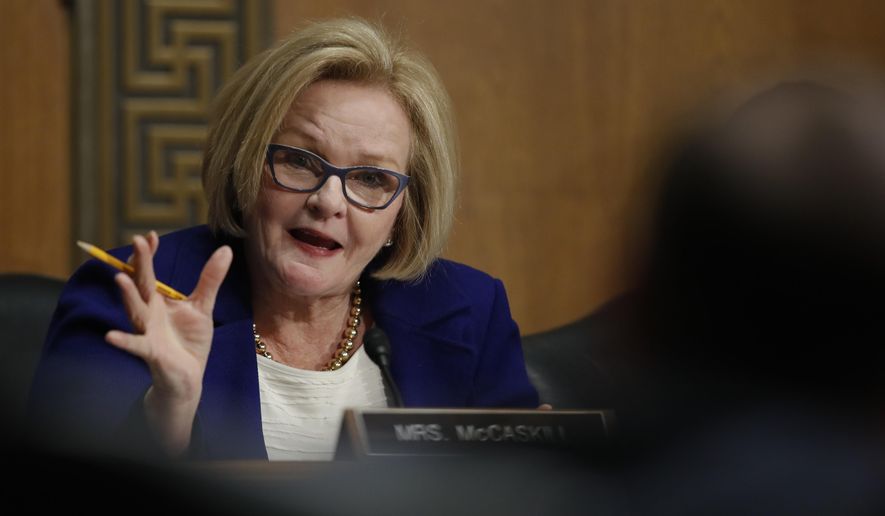Five opioid makers paid nearly $9 million to 14 outside groups who then “echoed and amplified messages favorable to increased opioid use” between 2012 to 2017, according to a new report by Sen. Claire McCaskill that alleges a link between donations and industry-friendly messaging.
Ms. McCaskill, Missouri Democrat, said the manufacturers have also paid $1.6 billion to physicians affiliated with the advocacy groups since 2013.
Her report says the groups then tried to block limits on prescription opioids, criticized prescribing guidelines and issued patient guides that suggested opioids were “rarely addictive” if used correctly.
“By aligning medical culture with industry goals in this way, many of the groups described in this report may have played a significant role in creating the necessary conditions for the U.S. opioids epidemic,” said Ms. McCaskill, the top-ranking Democrat on the Homeland Security and Governmental Affairs Committee.
Her report said it is concerning that charitable groups, many of which advocate for pain sufferers, are not required to disclose the donations because of their nonprofit status.
Ms. McCaskill, who faces re-election in a red state this year, is probing the role manufacturers might have played in launching the opioids crisis, which is killing tens of thousands of Americans per year.
Some people who get addicted to painkillers turn to heroin, which may contain highly deadly fentanyl.
Lawsuits from numerous state attorneys general have pointed the finger at opioid makers and distributors, saying they created a public health crisis by shrouding the risks of their products.
Companies cited in Ms. McCaskill’s report said they acted within the law to help patients.
“We have supported third-party organizations, including with annual dues and unrestricted grants, that are interested in helping patients receive appropriate care and share our commitment toward addressing the opioid crisis,” said Purdue Pharma, which makes OxyContin and donated more than $4 million to outside groups — the largest share among the five studied manufacturers.
Purdue, which recently announced it would no longer promote opioids to prescribers, said it feels that prescribing guidelines issued by the Centers for Disease Control and Prevention in 2016 to address the crisis are an “important public health tool.”
Insys, which donated the second-largest share in the report, said its contributions complied with all laws and had patients in mind. It said it cut its contributions by 77 percent in the second half of 2017, anyway.
“Principally, our new management team believes that the best way we can assist patients in serving unmet medical needs within our budgetary constraints is to deliver on our innovative R&D pipeline, which will require significant investment as well as optimizing spending across our organization,” the company said.
Another company, Depomed, said it has “acted responsibly with respect to the marketing and advertising” of Lazanda and Nucynta — a pair of pain-relieving drugs they’ve divested to other companies.
Mylan, a company that came under fire last year for its EpiPen pricing, said it has a “minuscule role” in the manufacturing and marketing of opioids — it said it supplied about 1 percent of opioids sold in the U.S. in 2016 — so it should not have been in the report.
“Lumping Mylan in with this group of companies is not only highly irresponsible, but also highlights more of a political agenda rather than finding real solution to the opioids crisis,” the company said.
Groups receiving donations said the money didn’t guide their actions.
Ms. McCaskill’s report said the Academy of Integrative Pain Management, which received $1.2 million from manufacturers, lobbied states to resist curbs on opioids prescribing.
Bob Twillman, the academy’s executive director, said the report only told half the story, and that it if anything, the group has spent more of its energy promoting a decrease in opioid-related pain relief.
“When we have advocated on opioid issues, we’ve advocated against policies that would tie the hands of our members to such a degree that they would be unable to provide optimal care to their patients, some of whom, like it or not, need opioids for pain relief,” he said.
Paul Gileno, founder and CEO of the U.S. Pain Foundation, said the $2.5 million it received last year helped cancer patients with copays for drugs, and that it does not use contributions to lobby for one type of treatment over another.
“This funding, like any funding we receive, does not influence our values,” he said. “When it comes to opioids, we believe both that people with legitimate pain have a right to effective care and that systematic changes must be made to address the ongoing opioid crisis. As a patient advocacy organization, we support the discovery and development of safer, more effective pain treatments.”
Ms. McCaskill’s report acknowledges that it doesn’t cover the full scope of contributions from opioid makers to advocacy groups, citing an investigation by The Associated Press and Center for Public Integrity that said manufacturers “spent more than $880 million nationwide on lobbying and campaign contributions from 2006 through 2015 — more than 200 times what those advocating for stricter [opioid] policies spent.”
• Tom Howell Jr. can be reached at thowell@washingtontimes.com.




Please read our comment policy before commenting.